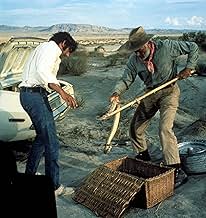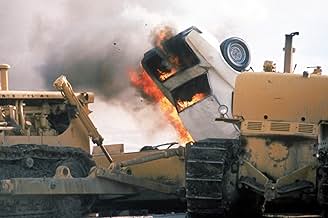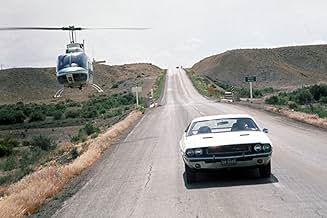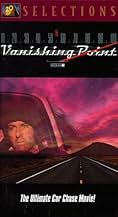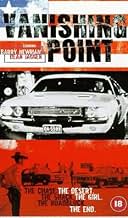VALUTAZIONE IMDb
7,2/10
31.774
LA TUA VALUTAZIONE
Kovalski è incaricato di consegnare un'auto da una costa all'altra degli Stati Uniti nel minore tempo possible, ma la polizia stradale ha altre idee.Kovalski è incaricato di consegnare un'auto da una costa all'altra degli Stati Uniti nel minore tempo possible, ma la polizia stradale ha altre idee.Kovalski è incaricato di consegnare un'auto da una costa all'altra degli Stati Uniti nel minore tempo possible, ma la polizia stradale ha altre idee.
- Regia
- Sceneggiatura
- Star
- Premi
- 1 candidatura in totale
Charlotte Rampling
- Hitch-Hiker
- (scene tagliate)
Robert Donner
- Deputy Collins
- (as Bob Donner)
Recensioni in evidenza
One thing I realised about carfilms, or whatever you might call them, is that a certain degree of monotony is always required (check out the wonderful Two Lane Blacktop too see what I mean). If you waste too much time with backgrounds, character development, story etc the really important stuff starts lacking (the car as an instrument of freedom, the road, the desert...). In this way Vanishing Point is the perfect carmovie: it's about the most monotonous, yet beautiful things i've ever seen! It's about:
1. The car
2. The road
3. The desert
4. The music
And nothing else! Some vague attempts are made to make a character out of Kowalski, but fortunely they're small in numbers. The car is the true main character of the film.
I recommend this film with all my heart.
1. The car
2. The road
3. The desert
4. The music
And nothing else! Some vague attempts are made to make a character out of Kowalski, but fortunely they're small in numbers. The car is the true main character of the film.
I recommend this film with all my heart.
Many people don't know where the radio d.j. was broadcasting from in the movie. He was broadcasting from the then closed Goldfield Hotel, in beautiful "downtown" Goldfield Nevada! I should know! I was a resident in this picturesque little town of 110 people (in 1971). The Goldfield Hotel has since found new life as a restored historical landmark. The town itself has surged in population due to new mining processes, and the re-opening of the long closed mines. During the movie, a scene picturing the front of the "Green Frog Market", you will see the faint glow of a freckle-faced, red headed little boy, gazing out of the window......yeah..it's me!! This movie was quite exciting in a town of 110 people!
This is the essential 1970s anti-hero movie. It is not supposed to make sense and I have often wondered if it were not meant to be someone's psychedelic dream. Nudity when nudity would not seem to fit; bad cops; beaten people out of sync with plot line. Sounds like a trip. The cast is excellent and this is one of Cleavon Little's last main roles as well as the last main role for the early love interest. John Amos is so underplayed he is almost unrecognizable, I'd love to see his commentary on the movie. And one guy is so ripping off James Dean (though as a racist) that it is unintentionally funny. I'd recommend it as an addition to any American tape library. A true cult classic.
The best road movie ever made. To appreciate it you have got to try and see it from the culture of that era. It is totally anti establishment as was the mood of half of America. So the police are all idiots, the 'good ol boys' are either violent rednecks or passive disapproving onlookers. Kowalski is going to give those mid west conservatives something they won't forget, he's going to shake things up for a day or two. Kowalski is simply the symbol of the many disenfranchised at the time. The story starts at the end. We hear a boring stifling radio news item on the price of grain. We see dreary looking bystanders who need to be turned on. Then Super Soul takes over the airwaves with his wild DJ antics and hippy music trying to jolt these people out of their fixed ways. The old and the new are clashing. This sets the mood we know from then it is rebellious. Other aspects the stunts the music the characters have been well covered below so there is no need to say more on that. Some have said that there is no point to this story or Kowalski's motives and have interpreted the title meaning that. But all a vanishing point is an artist name for the phenomena of perspective where two parallel lines seemingly meet and in the long straight roads of the journey we see plenty of vanishing points.
10AdamKey
Richard Sarafian's 1971 film "Vanishing Point" is, for starters, a fascinating study of those persons anthropologists sometimes term "marginal men"--individuals caught between two powerful and competing cultures, sharing some important aspects of both but not a true part of either, and, as such, remain tragically confined to an often-painful existential loneliness. Inhabiting a sort of twilight zone between "here" and "there," a sort of peculiar purgatory, these restless specters cannot find any peace or place, so they instead instinctively press madly on to some obscure and unknown destination, the relentless journey itself being the only reason and justification.
Disc jockey Super Soul (Cleavon Little) and delivery driver Kowalski (Barry Newman) are two of these specters, marginal but decent, intelligent men who can't or won't live in burgeoning competing cultures which in reality have offered them very little of worth or substance, despite their own personal sacrifices. Kowalski himself had tried to "fit in" with the Establishment as a soldier and police officer and later, attempted to do the same with the blossoming 1960s counterculture, but soon disappointingly found that they both were ridden with their own various forms of dishonesty and insincerity. Personal honor, self-reliance and genuine respect--Kowalski's stock in trade--were tragically valued very little by either, despite each one's shrill and haughty claims to the contrary.
Moreover, it's no accident Newman's character has a Polish surname; the Poles throughout their history have created a very rich and unique Slavic culture largely based upon just such a "marginality"--being geographically jammed between powerful historic enemies, Germany and Russia, and never being able to fully identify with either one, at often great cost to themselves. It's also no accident Little's character is blind and black, the only one of his kind in a small, all-Caucasian western desert town--his sightlessness enhancing his persuasiveness and his ability to read Kowalski's mind, the radio microphone his voice, his race being the focus of long simmering and later suddenly explosive disdain--all of the characteristics of a far-seeing prophet unjustly (but typically) dishonored in his own land.
The desert environment also plays a key role in cementing the personal relationship between and respective fates of these two men--to paraphrase British novelist J.G. Ballard, prophets throughout our history have emerged from deserts of some sort since deserts have, in a sense, exhausted their own futures (like Kowalski himself had already done) and thus are free of the concepts of time and existence as we have conventionally known them (as Super Soul instinctively knew, thus creating his own psychic link to the doomed driver.) Everything is somehow possible, and yet, somehow nothing is.
Finally, VP is also a "fin de siecle" story, a unique requiem for a quickly dying age- a now all-but-disappeared one of truly open roads, endless speed for the joy of speed's sake, of big, solid no-nonsense muscle cars, of taking radical chances, of living on the edge in a colorful world of endless possibility, seasoned with a large number and wide variety of all sorts of unusual characters, all of which had long made the USA a wonderful place--and sadly is no longer, having been supplanted by today's swarms of sadistic, military-weaponed cop-thugs, obsessive and intrusive safety freaks, soulless toll plazas, smug yuppie SUV drivers, tedious carbon-copy latte towns, and a childish craving for perfect, high-fuel-efficiency safety and security.
The just-issued DVD contains both the US and UK releases of the film; the UK release, I believe, is a much more satisfying film, as it has the original scenes deleted from the US version. As an aside, Super Soul's radio station call letters, KOW, are in fact the ones for a country & western station in San Diego.
Disc jockey Super Soul (Cleavon Little) and delivery driver Kowalski (Barry Newman) are two of these specters, marginal but decent, intelligent men who can't or won't live in burgeoning competing cultures which in reality have offered them very little of worth or substance, despite their own personal sacrifices. Kowalski himself had tried to "fit in" with the Establishment as a soldier and police officer and later, attempted to do the same with the blossoming 1960s counterculture, but soon disappointingly found that they both were ridden with their own various forms of dishonesty and insincerity. Personal honor, self-reliance and genuine respect--Kowalski's stock in trade--were tragically valued very little by either, despite each one's shrill and haughty claims to the contrary.
Moreover, it's no accident Newman's character has a Polish surname; the Poles throughout their history have created a very rich and unique Slavic culture largely based upon just such a "marginality"--being geographically jammed between powerful historic enemies, Germany and Russia, and never being able to fully identify with either one, at often great cost to themselves. It's also no accident Little's character is blind and black, the only one of his kind in a small, all-Caucasian western desert town--his sightlessness enhancing his persuasiveness and his ability to read Kowalski's mind, the radio microphone his voice, his race being the focus of long simmering and later suddenly explosive disdain--all of the characteristics of a far-seeing prophet unjustly (but typically) dishonored in his own land.
The desert environment also plays a key role in cementing the personal relationship between and respective fates of these two men--to paraphrase British novelist J.G. Ballard, prophets throughout our history have emerged from deserts of some sort since deserts have, in a sense, exhausted their own futures (like Kowalski himself had already done) and thus are free of the concepts of time and existence as we have conventionally known them (as Super Soul instinctively knew, thus creating his own psychic link to the doomed driver.) Everything is somehow possible, and yet, somehow nothing is.
Finally, VP is also a "fin de siecle" story, a unique requiem for a quickly dying age- a now all-but-disappeared one of truly open roads, endless speed for the joy of speed's sake, of big, solid no-nonsense muscle cars, of taking radical chances, of living on the edge in a colorful world of endless possibility, seasoned with a large number and wide variety of all sorts of unusual characters, all of which had long made the USA a wonderful place--and sadly is no longer, having been supplanted by today's swarms of sadistic, military-weaponed cop-thugs, obsessive and intrusive safety freaks, soulless toll plazas, smug yuppie SUV drivers, tedious carbon-copy latte towns, and a childish craving for perfect, high-fuel-efficiency safety and security.
The just-issued DVD contains both the US and UK releases of the film; the UK release, I believe, is a much more satisfying film, as it has the original scenes deleted from the US version. As an aside, Super Soul's radio station call letters, KOW, are in fact the ones for a country & western station in San Diego.
Lo sapevi?
- QuizIn an interview, actor Paul Koslo spoke about legendary stunt driver Cary Loftin; "One night coming home from location, Cary was driving one of the Challengers back to the hotel, and he passed some New Mexico state troopers going 145 miles an hour! [laughs] He had four or five cop cars behind him with their lights on, but they couldn't catch up because they could only go about 125! So he drove into this little town and started to shut the car down. He pulled into a gas station, and I swear to God, he did a 360 in between the pumps and put the rear of the car - the gas tank - right in front of the super pump! He got out of the car like nothing happened, and the troopers busted his ass right there! [laughs] Oh, you should've seen those cops! They were fuming! They took him in, and the producer had to explain to them that Cary had actually been testing the car - that he did a lot of these spinouts because he'd been having trouble with the car! [laughs] I mean, you do have to test the cars, but you don't do it while you're driving home!"
- BlooperThe 19-inch racks in Super Soul's radio station with large tape reels (in one scene seen fast moving) are not audio equipment. These tape drives were used in computer systems in the 1970s to store data on tape.
- Citazioni
Super Soul: This radio station was named Kowalski, in honour of the last American hero to whom speed means freedom of the soul. The question is not when's he gonna stop, but who is gonna stop him.
- Curiosità sui creditiThe Fox logo is shown without the fanfare making it one of the first times this has happened.
- Versioni alternativeWhen first released in Brazil, the movie had some scenes cut, reducing the running time to 99 minutes.
- Colonne sonoreYou Got to Believe
Composed by Delaney Bramlett
Sung by Delaney & Bonnie & Friends
(Courtesy of Atlantic Records)
I più visti
Accedi per valutare e creare un elenco di titoli salvati per ottenere consigli personalizzati
- How long is Vanishing Point?Powered by Alexa
- What are the differences between the US-Version and the UK-Version of this movie?
Dettagli
- Data di uscita
- Paese di origine
- Lingua
- Celebre anche come
- Carrera contra el destino
- Luoghi delle riprese
- Goldfield Hotel, Goldfield, Nevada, Stati Uniti(KOW radio station)
- Azienda produttrice
- Vedi altri crediti dell’azienda su IMDbPro
Botteghino
- Budget
- 1.585.000 USD (previsto)
- Lordo Stati Uniti e Canada
- 12.442.673 USD
- Lordo in tutto il mondo
- 12.443.722 USD
- Tempo di esecuzione1 ora 39 minuti
- Colore
- Proporzioni
- 1.85 : 1
Contribuisci a questa pagina
Suggerisci una modifica o aggiungi i contenuti mancanti



